Maximizing Client Outcomes through Personalized, Consultative Services
Helping ensure client success drives Rimini Street to excel. Account Managers are key to the formula, delivering a world-class experience by maximizing client outcomes from Rimini Street services throughout the life of the relationship.
Account Managers have extensive experience and expertise in enterprise software and IT strategy. By understanding strategic goals through collaborative planning with client teams, Rimini Street Account Managers make recommendations to help clients achieve their business and technology objectives.
The Value of Strategic Account Management
Highly personalized, consultative services are included with Rimini Street account management at no additional charge. Account Managers will:
- Partner with clients on developing and navigating a Business-Driven Roadmap
- Ensure clients derive full value from Rimini Street services
- Provide guidance and best practices for strategic decisions on issues such as interoperability, upgrades, cloud migration, digital transformation, analytics, mergers and acquisitions, and expansion plans.

“The significant savings we've achieved with third-party support has contributed to improved profitability, which in turn contributes to our ability to invest in new applications for the future and wider business initiatives. Rimini Street has been a game-changer for us.”
“Our move to Rimini Street brought other advantages beyond what we had expected, including freeing up time available for our IT team to focus on more strategic tasks.”
“Every year we've taken the money that we've saved by going to Rimini Street and we've reinvested it. We've invested into new systems that support our growth efforts. We've added a new CRM system; we've already added HR and payroll systems. They are all integrated into Oracle EBS, and for that matter, Rimini supports all that integration. We have a major initiative to move our Oracle as well as VMWare environments to the cloud and this year we will do that and Rimini will support us along the way. We consider Rimini Street a strategic partner. They are reliable, they're innovative, they're leading edge, and they will be our partner for years to come.”
Additional Resources
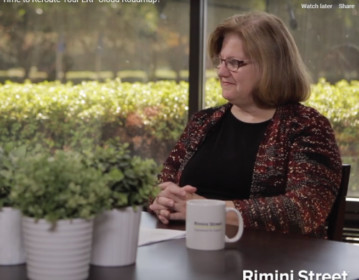
Many leaders in the IT space are ‘switching to the cloud’ for their ERP applications suite. As a result of this changing ecosystem, many professionals are trying to strategize their move to streamline the process. Pat Phelan, former Gartner analyst and now Vice President-Market Research at Rimini Street, will share lessons learned and insights gained from over 25 years of working with IT leaders on how to move ERP into the cloud era without breaking the bank or introducing unmanageable risk.
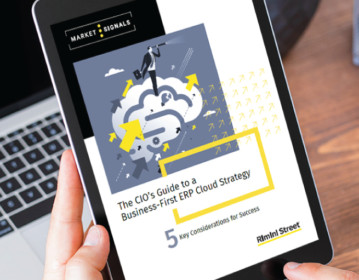
IT teams are feeling the pressure to move everything to the cloud. IDC predicts that by 2023, digital transformation spending will account for half of IT budgets. The majority of that spend will go to cloud technologies. Cloud promises flexibility, elasticity, and cost savings — but only if you’re doing it for the right reasons guided by a business-first, not a cloud-for-cloud’s-sake, mentality. Before making the leap, especially with business-critical ERP systems, companies need a solid strategy. Rimini Street offers this ebook to look at the multiple elements of building a business-first cloud strategy that delivers maximum value and optimal performance. Topics covered include: Developing a Business-Driven IT Roadmap Avoiding common pitfalls of ERP in cloud Surviving the secondary effects of cloud moves Fast-tracking — without sabotaging — your cloud strategy


During times of disruption, companies within the Gulf Cooperation Council (GCC) countries that innovate and proactively invest in their own future can emerge stronger on the other side. How are CTOs and CIOs leading the charge to meet their 2022 objectives in a business landscape that included a global pandemic and economic and political uncertainty? What is the role — and priority — of technology in combating disruption for organisations with GCC countries? What are IT leaders’ feelings towards digital transformation and the cloud? What are their top IT initiatives for 2022? In this report sponsored by Rimini Street, Censuswide reveals results of its GCC region IT buyer sentiment survey covering industries including Telecoms, Financial Services, Oil and Gas, Retail, Manufacturing. They provide insights on those questions and more, including: What types of initiatives would IT leaders like to see more of in 2022? What initiatives would IT leaders like to cancel in 2022? What are the biggest challenges being faced when trying to meet digital transformation objectives? What are IT leaders’ plans, if any, for cloud migration? What % feel positively about their enterprise application vendor’s cloud offering? What % are looking to move to an open-source database? What % are dissatisfied with their enterprise application vendor support and why? Assess how your organisation stacks up — and your progress on digital transformation — by downloading the report today.

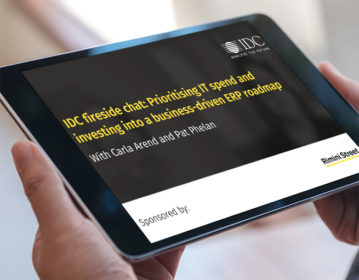

Ideally, digital transformation moves at the speed of business. Unfortunately, ERP innovation does not. Hybrid IT solutions can help you keep up. A hybrid IT environment includes a combination of internally deployed technology and cloud-based technology. The key to optimizing hybrid IT — and hybrid IT ROI — is determining what moves to the cloud and what stays put. When considering the decision, it’s important to stay focused on your own enterprise rather than what others, including competitors, may be doing. Your criteria for a hybrid IT model will be unique to your business. What’s the ideal mix? Consider these three factors when designing your hybrid IT model: collaboration with other IT ecosystems, including suppliers and partners integration risk tolerance for data and processes hybrid IT environment security including, e.g., visibility into SaaS security Moving technology to the cloud is an important, highly visible decision. This white paper contains a detailed analysis for evaluating the factors, best practice recommendations, and a sample framework for assessing cloud readiness. Read this white paper and start creating your successful hybrid IT model today.
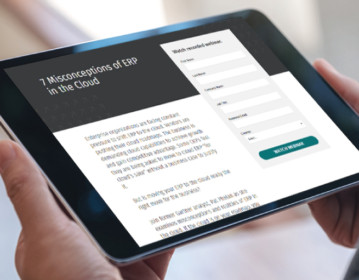
Enterprise organizations are facing constant pressure to shift ERP to the cloud. Vendors are pushing their cloud roadmaps. The business is demanding cloud capabilities to achieve growth and gain competitive advantage. Some CIO’s feel they are being asked to move to cloud ERP “for cloud’s sake” without a business case to justify it. But is moving your ERP to the cloud really the right move for the business? Join former Gartner analyst, Pat Phelan as she examines misconceptions and realities of ERP in the cloud. If the cloud is on your roadmap, you won’t want to miss this webinar. Register now.
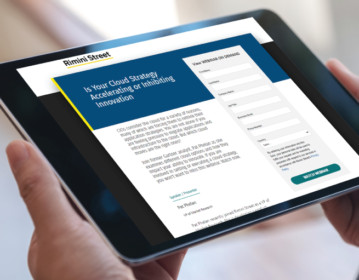
CIOs consider the cloud for a variety of reasons, many of which are forcing them to rethink their application strategies. You are not alone if you are feeling pressure to migrate applications and infrastructure to the cloud. But which cloud moves are the right ones? Join former Gartner analyst, Pat Phelan as she examines different cloud options and how they impact your ability to innovate. If you are involved in setting or executing a cloud strategy, you won’t want to miss this webinar. Watch now.












